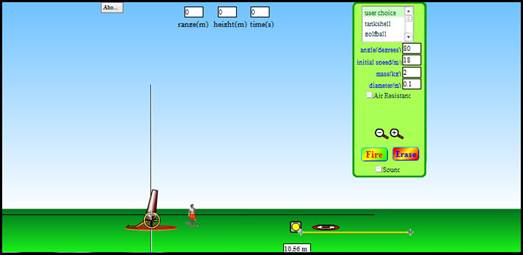LEARNING AND SIMULATING
PROJECTILE MOTION
During the first part of the lab you are
given the opportunity to hypothesize about a projectiles angle, velocity,
range, maximum height and time of travel. You will see how these variables
directly affect a projectile. In part
two of the lab you will observe a projectile with and without air resistance in
order to determine the effect of air resistance on a projectile. In part two,
you will also be able to see how mass affects a projectile in terms of angle
and initial velocity.
Part I
Go
to the University of Colorado Physics Simulations Website PhET:
http://phet.colorado.edu/sims/projectile-motion/projectile-motion_en.html
Download the printable
worksheet below. Once you have the worksheet completed ,
scroll to question #1.
Projection Motion Simulator Worksheet

You
can grab, drag, rotate, and stretch the objects to satisfy the requirements.
You can also use + and - , ERASE, and FIRE buttons. You can download the labs to your desktop. It is wise to house
all of the simulations in a folder so you can refer back to them when needed.
Assume
no air resistance. Set the sound on.
Part II
Use the same simulator as in Part I.
http://phet.colorado.edu/sims/projectile-motion/projectile-motion_en.html
Download the printable
worksheet below. Once you have the worksheet completed ,
scroll to question #9.
Learning
and Simulating Projectile Motion Worksheet

Below are additional educational resources and activities for this unit.